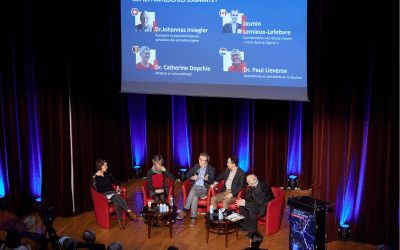On June 19, 2017, the French National Academy of Medicine published its report in favor of extending the law for extracting and preserving one’s oocytes (eggs) to include authorization for non-medical reasons. This would allow all women to have their eggs extracted and frozen in order to postpone childbearing to a later date.
Heretofore, the fundamental principle in France has been to allow freezing of one’s oocytes uniquely for medical reasons, such as malignant diseases when treatments impair ovarian function (such as chemotherapy or radiation treatment) or risks of premature or early menopause.
Preserving one’s oocytes is a complicated procedure. Stimulating the ovaries requires hormonal treatments and sonograms over several times a week, stimulating the ovaries, extracting a few oocytes, and then preserving them in liquid nitrogen at -198°C by a flash-freezing process known as vitrification. Due to both the physical and psychological risks inherent in this procedure, oocyte donation was originally authorized uniquely for women who had already given birth.
The report refers to a recent international study, which states « the success rate of pregnancy for a devitrified (thawed) oocyte is only 4.5 % – 12%. Therefore at least 15-20 oocytes need to be vitrified (flash-frozen), which almost always requires multiple sequences to obtain a reasonable hope of childbirth”.
To solicit donations, following a controversial debate when the 2011 Bioethics Law was being examined, oocyte donation was authorized for women who had never given birth. “As a reward” for their efforts, they were given the opportunity to preserve some of their own eggs, for non-medical reasons. The legislative act was promulgated at the end of 2015.
According to the most recent statistics from the French Biomedicine Agency, gamete donations account for about 1400 children born every year, including approximately 200 infants from oocyte donations.
The report admits that a survey has not been carried out to calculate the exact statistics, but declares that French women wishing to preserve their eggs for a future pregnancy, travel abroad, especially “to the UK, Belgium, or Italy; many go to Spain, and more and more women go to the Check Republic where costs are lower”.
In Spain, 94% of the requests for preserving one’s eggs are age-related: 1468 vitrification procedures were performed in 2015 for non-medical reasons, including 42 from France. Some Spanish clinics have developed a booming business including offers of Assisted Reproduction Techniques (ART) which are prohibited in France, complete with advertisements via French web sites and with French-speaking staff. In the same year, there were a total of 110 requests recorded in Belgium, and 110 in Holland.
Whilst the Bioethics Law may be revised in 2018, the Academy recommends allowing oocyte preservation to be extended for age reasons. When speaking of the natural decrease in fertility due to ageing, the academics refer to it as an “age-related pathology.” They add that the procedure must “only be offered to adult women, under certain conditions: providing comprehensive and mandatory information regarding the methods and their cost, specifying the recommended age for egg-retrieval prior to the age of 35, and that oocytes be re-implanted before age 45, mentioning the incumbent risk of failure or complications related to the procedure, and the risks of pregnancy in older women. The report does not address the funding procedure, or whether or not it should be reimbursed by the French social security insurance.
The Academy is recommending this procedure as an alternative to egg donations for age-related uses; by mentioning risks which have nevertheless rarely been addressed in the past. “This offers an advantage for avoiding pregnancy complications due to oocyte donation from another person (higher rate of preeclampsia,intrauterine growth restriction)…”
Alliance VITA’s viewpoint :
Why such tenacity in relentlessly developing more and more medical techniques for procreation? We are astonished that professionals involved in pregnancy are not more proactive: with specific suggestions and information awareness campaigns on the risks of delaying pregnancy. Instead they are trying to attract women by promising them a hypothetical pregnancy at a later date, which is not without medical risks and is not always a successful procedure. Perplexities are raised faced with this “extreme persistence on procreating” without any medical reason whatsoever, emanating from those playing both the part of both judge and jury.
International Symposium on the End of Life – Euthanasia and Assisted Suicide Worldwide
At a time when France is considering legalising euthanasia and assisted suicide, Alliance VITA, together with IEB...



